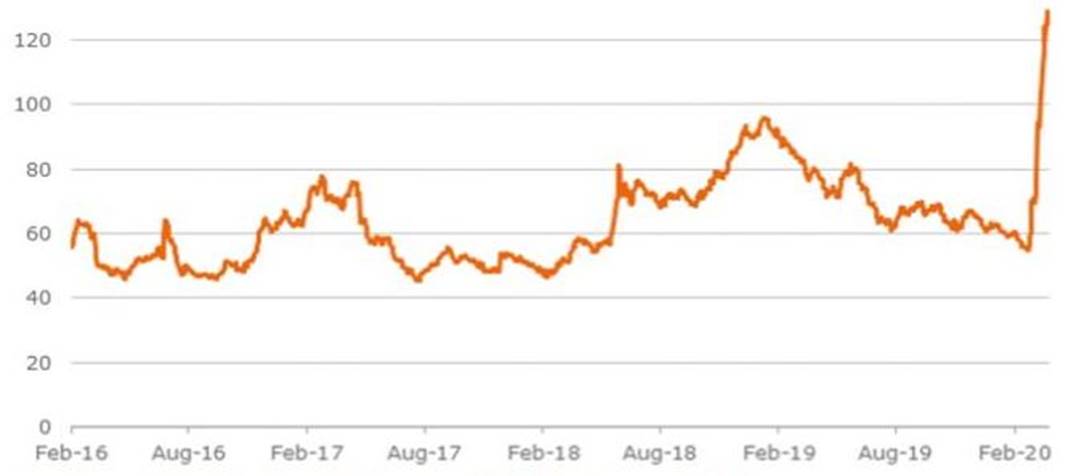Investment Strategies
How Are "Green Bonds" Coping With COVID-19 Turmoil?

An investment firm takes a look at how the market for green bonds is faring in the current extremely challenging environment.
The market for “Green” bonds, a market tapping into funding
of zero- or low-carbon energy projects and ventures designed to
protect the environment, has grown rapidly. The global pandemic
poses a big challenge to whether investors can stay the course
through this crisis.
Infrastructure around such debt instruments has flourished in
recent years. A new set of principles emerged in 2018 under which
the Loan Market Association (the leading professional association
of banks) released the green loan principles. These principles
aim at creating a framework for the green loan market. They were
followed in March 2019 by the sustainability loan standards.
Here are recent comments about a green bond market that now is
about a decade old. The comments come from says Bram Bos, lead
portfolio manager for Green Bonds at NN Investment
Partners. (Seperately, this publication has been examining
continued trends in the ESG space; see here for a brief
overview.)
“In the current market environment, when traditional bonds sell
off, green bonds sell off too. That is a fact”, Bos said. “In the
last few weeks, there has not be a significant difference in how
green bonds have behaved in comparison to their traditional
peers.”
In markets like these, prices are not necessarily a reliable
measure of underlying sentiment, he reckons. According to Bos,
flows are more important; most green bond portfolios and managers
are holding on to the bonds in their portfolios.
Looking at traditional corporates versus corporate green bonds,
the performance of the corporates index has been slightly better.
“Its composition offers a possible explanation to this,” Bos
said. “The green bond corporate index does not include airlines
or energy companies – those sectors were hit by the compounded
effects of the coronavirus and the plummeting oil price. However,
it does, for example, include utility companies that have
well-regulated businesses. These tend to be better prepared for
uncertain times, are more forward looking and are often better
managed than firms that do not issue green bonds,” he
continued.
Cyclical sectors appear to be suffering in the current
environment, irrespective of whether they have issued green debt
or not. But the longer-term trend is more important. In the case
of the automobile industry, for example, the trend away from
fossil fuel and towards renewable energy is not going to change
because of this crisis. NN IP said it thinks those companies that
are investing in making this transition, will have the best
chance of survival in the long run. Although investors may
temporarily lose sight of these aspects in the day-to-day
volatility of short-term market movements, these companies are
well-prepared, it said.
“In our experience, companies that issue green bonds are more
forward-looking, more innovative and more flexible,” Bos
said.
Spread Bloomberg Barclays MSCI Euro Green Bond Index (bps)

Source: Refinitiv Datastream, NN Investment Partners
The current volatile environment does not seem to be impacting
the trend towards sustainable finance – allocations to green
bonds are not being affected at all. “Although it’s still early
days to draw any major conclusions”, Bos said, “we don’t see
interest in green bonds diminishing in terms of our clients, nor
are our funds experiencing much outflow. In general, investors
seem to be pushing ahead with their plans to make new allocations
to green bonds.”
Looking ahead, there are some positives that could come out of
this situation, but a lot will depend on how long this crisis
lasts. Markets could fall further and we could see more defaults
before things get better, NN Investment Partners said.
“I think many companies will start to appreciate the qualities of
green bonds as a funding tool. The traditional capital markets
are suffering in these uncertain times and although green bonds
fall too, the underlying demand is intact. It is all about being
prepared and making your business future-proof. The next crisis
could be a climate crisis. The current situation is triggering
companies to look ahead.
Governments are also going to have to spend more. In particular,
I believe their green expenditure will increase. They also want
to make their economies more resilient. So yes, I'm very
convinced there will only be more demand. We should see a
continuation of the growth of the last two years and the effects
of the crisis may even give the green bond market an additional
boost,” he said.
NN IP expects the sovereign green bond segment to also benefit
from the unprecedented fiscal and monetary policy response. This
segment currently makes up about 17 per cent of the total green
bond market, with fewer than ten issuers so far. Even prior to
the coronavirus crisis, this was set to change with a number of
new potential European sovereign candidates for 2020, including
Germany, Italy, Spain, Sweden and Denmark.